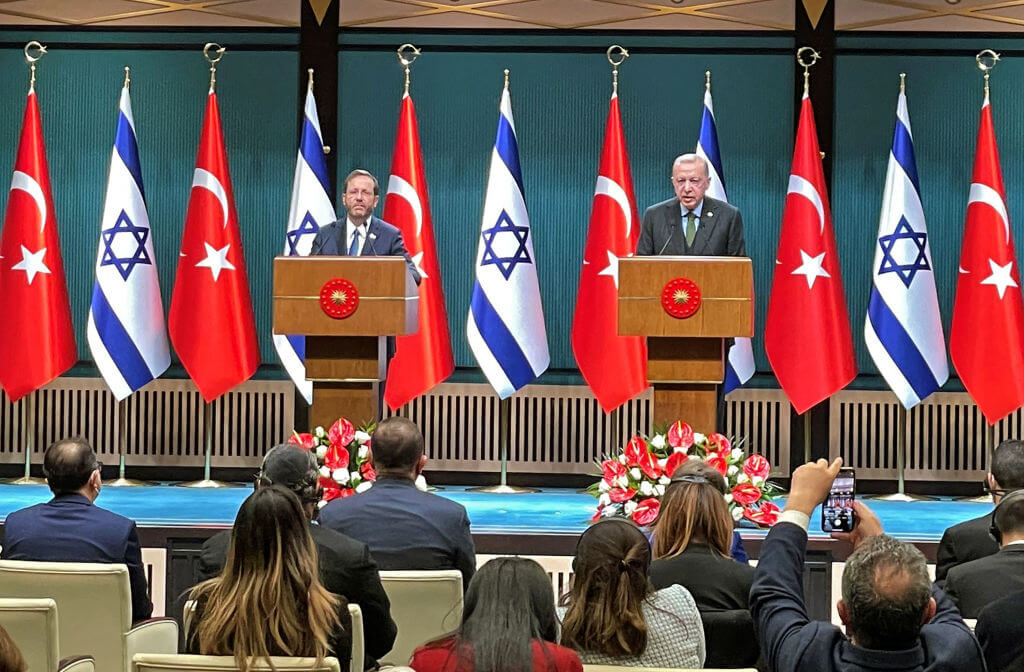Israel, Turkey restore full diplomatic ties
‘Restoring ties with Turkey is an important asset to the stability of the region and bears great economic significance to Israel’s citizens,’ Lapid says

Israeli President Isaac Herzog (L) and his Turkish counterpart Recep Tayyip Erdogan give a joint press conference in the capital Ankara, on March 9, 2022. Photo by Getty Images
This article originally appeared on Haaretz, and was reprinted here with permission. Sign up here to get Haaretz’s free Daily Brief newsletter delivered to your inbox.
Prime Minister Yair Lapid and Turkish President Recep Tayyip Erdogan spoke on Wednesday and agreed on reinstating their respective ambassadors and general consuls, thus restoring full diplomatic ties.
Lapid said in a statement that “restoring ties with Turkey is an important asset to the stability of the region and bears great economic significance to Israel’s citizens.
“We’ll continue working and strengthening Israel’s international standing in the world,” Lapid said.
President Isaac Herzog also welcomed the renewal of diplomatic ties with Turkey, calling it an “important development.”
Turkish foreign minister Mevlut Cavusoglu said the appointment of new ambassadors will begin in the next few days, and that it is a “positive step” in the relationship between the two countries. He added that Turkey will continue to protect the rights of Palestinians through its renewed relations with Israel.
I commend the renewal of full diplomatic relations with Turkey—an important development that we've been leading for the past year, which will encourage greater economic relations, mutual tourism, and friendship between the Israeli and Turkish peoples. ???? @RTErdogan pic.twitter.com/If5JsKfAfV
— יצחק הרצוג Isaac Herzog (@Isaac_Herzog) August 17, 2022
Ankara and Jerusalem both withdrew their respective ambassadors following the U.S. recognition of Jerusalem as Israel’s capital in 2018, following more than a decade of tensions between the two capitals, including over such incidents as the 2010 Mavi Marmara incident in which nine people were killed by Israeli troops on a Turkish ship attempting to break the blockade of the Gaza Strip.
Yet despite the lack of high-level diplomatic relations, Israel has retained several back-channel communication methods with Ankara, which was previously a close regional ally, and Erdogan had told Jewish leaders that his country’s relationship with Israel is “vital for the stability of our region” and that “we must all work together to strengthen peace and stability in the Middle East.”
Despite this, he and his associates kept up a steady stream of critical (and sometimes antisemitic) remarks, with Erdogan accusing Israel of “killing children and babies” as recently as last week. During his remarks, he stated that his administration’s regional diplomacy and said ties with Israel “are back on track,” and serve to “defend the rights of our Palestinian brothers and sisters.”
Erdogan made efforts to renew diplomatic relations with Israel in the last two years, but was met with suspicion from Israeli officials. “A change of leadership in Israel was a needed in order to rehabilitate relations between Israel and Turkey,” says Dr. Nimrod Goren, President of the Mitvim research institute for regional foreign policy. “Since June the two countries have engaged in a slow and careful process of improving their diplomatic relations,” he added.
In March, President Isaac Herzog and Erdogan met in Ankara, marking the first official Israeli visit by a statesman in 14 years. In a joint statement at the end of Herzog’s trip, Erdogan said that the meeting was “historic and will serve as a turning point in the relations between the two countries.”
Israeli political figures are worried that more flip-flopping on the part of the Turkish leader, especially concerning the Palestinian question, might lead to another breakdown just after an ambassador exchange. One of Israel’s main demands ahead of advancing ties is that Ankara work harder to stop Hamas activities in Turkey, and that it take a hard line against Hamas actions against Israelis.
At the same time, Israel and Turkey both want to strengthen coordination with each other when it comes to their attacks in Syria. Both see the Iranian presence in Syria as a threat to their stability, each is active in the air over Syria and each is dealing with the Russian military presence there.
Both countries hold an interest in improving dialogue on this issue to prevent Turkish harm to Israeli aircraft and vice versa. They have also recently been discussing the possibility of cooperation in what has been defined as “regional architecture,” in an attempt to restrict terror by Iranians who are working to gain a foothold in Syria.
Prior to the visit, Erdogan had been working to warm relations between the countries, stating publicly that he wants to meet with President Herzog in order to accomplish this goal. A Turkish source revealed that Erdogan saw in Herzog a “responsible adult” in the tumultuous political landscape in Israel in the past few years.
The shift in attitude towards Israel was concurrent with the economic crisis in Turkey. Israeli officials were initially suspicious of Erdogan, who is known for his criticism of Israel and support for Palestinians.
Turkish foreign minister, Mevlut Cavusoglu, arrived for a two-day visit this May, followed by a visit to Ankara by Prime Minister Yair Lapid in June, during which he thanked Turkey for thwarting Iranian terror attempts targeting Israelis on its soil, highlighting rapidly improving ties.
Prior to Lapid’s visit, nearly ten suspects were arrested in an operation in Istanbul on suspicion of planning targeted attacks on Israeli diplomats and tour groups in Istanbul.






















